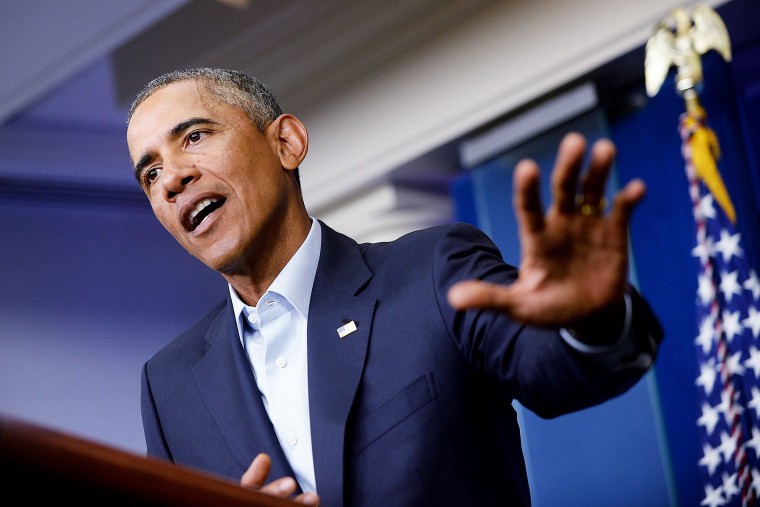President Barack Obama admonished both police and protesters at press conference Monday, following days of heated clashes between authorities and residents in Ferugson, Missouri protesting the killing of Michael Brown, an unarmed black 18-year-old who was shot by white police officer Darren Wilson. Police have said Wilson acted in self-defense after Brown attempted to grab Wilson's gun.
Obama also announced that Attorney General Eric Holder would travel Wednesday to Ferguson. But the president largely avoided discussing the racial tensions that have been exposed in the wake of Brown's killing.
"While I understand the passions and the anger that arise over the death of Michael Brown, giving into that anger by looting or carrying guns, and even attacking the police only serves to raise tensions and stir chaos. It undermines rather than advancing justice," Obama said. "Let me also be clear that our constitutional rights to speak freely, to assemble, and to report in the press must be vigilantly safeguarded. Especially in moments like these. There’s no excuse for excessive force by police or any action that denies people the right to protest peacefully."
"To a community in Ferguson that is rightly hurting and looking for answers, let me call once again for us to seek some understanding rather than simply holler at each other. Let’s seek to heal rather than to wound each other," Obama continued.
Obama is renowned for speaking eloquently about America's lingering racial divides and how to bridge them -- but he has also come under attack from critics on the right, particularly when it comes to racial profiling. During the press conference Monday Obama seemed to prefer discussing the ongoing U.S. mission in Iraq, where large swaths of territory have been taken over by the Muslim extremist he referred to as the Islamic State in Iraq and the Levant. ISIL has rampaged through the country, displacing and killing Iraqis in their pursuit of a fundamentalist state. There was perhaps better news about Iraq, where U.S. airstrikes and Kurdish fighters appear to have at least temporarily turned back ISIL, than Ferguson, where the conflict between protesters and police appears to be escalating.
When a reporter asked whether Obama himself would visit Ferguson, Obama spoke for several minutes without giving a direct answer.
"I have to be very careful about not prejudging these events before investigations are completed," Obama said. "Because, although these are, you know, issues of local jurisdiction -- you know, the DOJ works for me. And then when they’re conducting an investigation, I’ve got to make sure that I don’t look like I’m putting my thumb on the scales one way or the other."
Yet Obama seemed reluctant to comment not just on the pending investigation, but also racial disparities in the criminal justice system that are common knowledge. "Sentencing may be different. How trials are conducted may be different," Obama said. "There are young black men that commit crime. And -- and -- and we can argue about why that happens because of the poverty they were born into or the lack of opportunity or the school systems that failed them or what have you, but if they commit a crime, then they need to be prosecuted because every community has an interest in public safety."
Clashes in Ferguson took a turn for the worse Sunday night, as police said they were fired upon and attacked with Molotov cocktails and protesters and journalists were threatened and tear gassed. Missouri Democratic Gov. Jay Nixon called in the National Guard Monday morning, and shop owners in Ferguson were boarding up their establishments in anticipation of possible looters.
Americans have watched as protesters have been tear gassed and fired upon with rubber-coated bullets by police bearing military-style uniforms and equipment. The protesters have been further outraged by the release of information implicating Brown in an alleged robbery prior to the shooting, but little information about the circumstances under which he was shot. Wilson, whose name was only disclosed Friday alongside the footage of Brown apparently robbing cigars from a convenience store, has not been charged with a crime, but the case has reportedly been referred to a grand jury.
Obama did briefly address complaints about the militarization of state and local police through federal grants, which has led to calls for reform from both parties in Congress. "I think it’s probably useful for us to review how the funding has gone, how local law enforcement has used grant dollars, to make sure that what they’re -- what they’re purchasing is stuff that they actually need," Obama said. "One of the great things about the United States has been our ability to maintain a distinction between our military and domestic law enforcement. That helps preserve our civil liberties. That helps ensure that the military is accountable to civilian direction. And that has to be preserved."
Obama announced that Department of Justice officials were already on the ground trying to bridge the divide between local authorities and residents.
"Part of the ongoing challenge of perfecting our union has involved dealing with communities that feel left behind, who, as a consequence of tragic histories, often find themselves isolated, often find themselves without hope, without economic prospects," Obama said. "We’ve made extraordinary progress, but we have not made enough progress."
